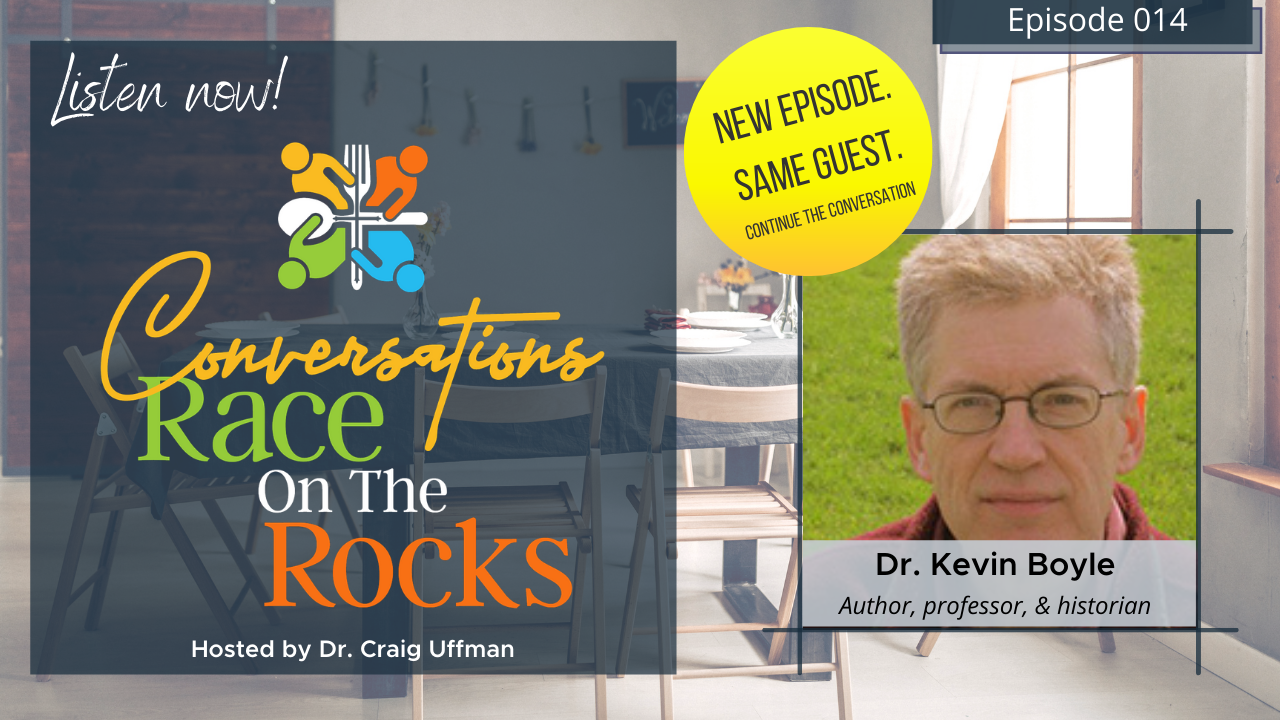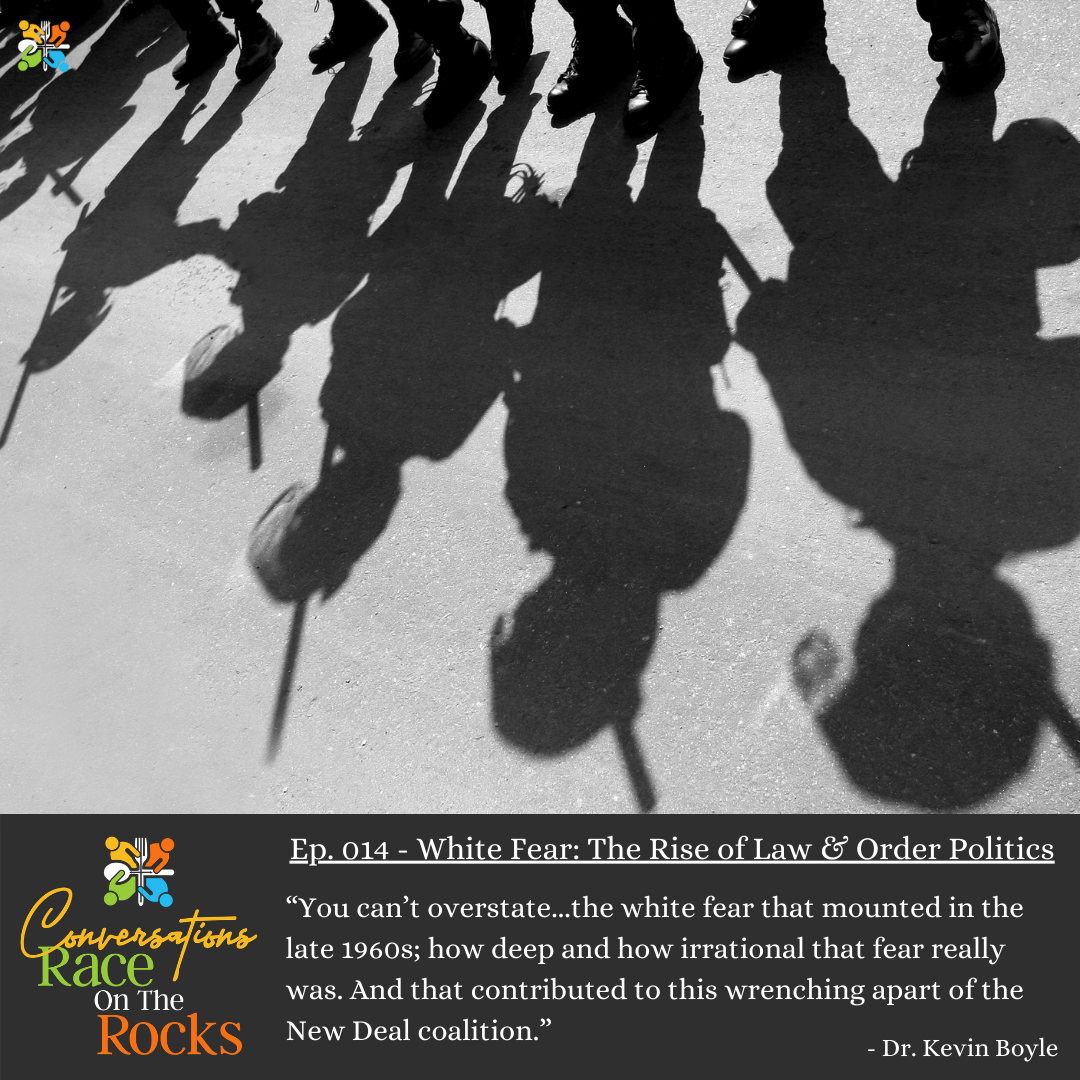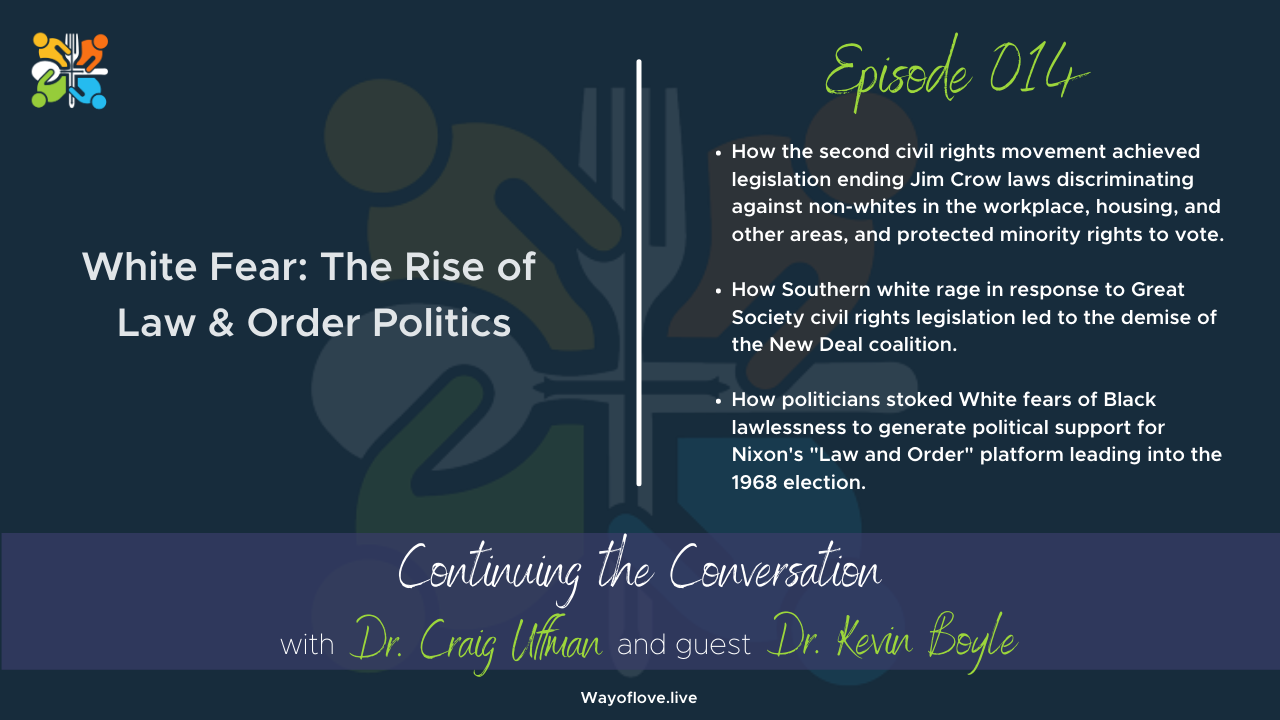“African Americans don’t receive aid quite to the degree that Whites do. Early on, huge numbers of black people are excluded from Social Security. They are not allowed to participate in it. If you’re a farm worker, which is a huge number of poor African Americans in the South, they weren’t in the original Social Security Act. If you were a domestic worker, a maid, you weren’t in the Social Security Act. But for all that discrimination, what New Deal programs did do is help African Americans in a way that the government hadn’t done before.” - Dr. Kevin Boyle
Listen now on Spotify, Apple Podcasts, Google Podcasts, Stitcher and more!

In our last episode, we concluded a conversation with Dr. Kevin Boyle about the struggles and the fruits of our Civil Rights era. Specifically, we talked about our struggle toward justice in regards to housing, education, and the right to vote. Welcoming back Dr. Kevin Boyle as today’s guest, we take a few steps back to discuss the New Deal and its impact on the Civil Rights Movement in the 60s.
As a reminder, Dr. Boyle is a professor at Northwestern University specializing in 20th century United States history. He has a particular focus on modern American social movements, such as the Civil Rights Movement. Dr. Boyle has a long list of publications and honors including fellowships from the National Endowment for the Humanities and the Andrew Carnegie Corporation. He is the highly acclaimed author of Arc of Justice: A Saga of Race, Civil Rights, and Murder in the Jazz Age, which was a finalist for the Pulitzer Prize and received the National Book Award for Nonfiction and many others.
Join us today as we dig deeper into the events in United States history that have shaped the racial landscape of today.
Questions for Clergy and Other Group Leaders
- What was the New Deal coalition, and how did FDR create it legislatively?
- Summarize briefly the three legislative achievements of the Great Society concerning civil rights. What hopes did they spawn?
- Describe the massive shift in the electorate and the rise of a new governing coalition that began to appear with Nixon.
- How did White rage in response to civil rights legislation and fear set the stage for law and order politics to dominate the ensuing decades?

Show Notes
- [3:15] - Dr. Boyle begins the conversation today by describing the Civil Rights Act of 1964, which prohibited the segregation of public space and outlawed discrimination in employment.
- [4:02] - The enduring achievements of the second civil rights movement were the the Civil Rights Act of 1964, the Voting Rights Act of 1965, and the Housing Act of 1968.
- [5:13] - Dr. Uffman reminds us that there was a Civil Rights Act passed after the Civil War but was famously vetoed by Andrew Johnson.
- [6:01] - Following the veto of that first Civil Rights Act, Dr. Uffman lists several events that took place to lead the United States to its condition in the 1950s and 60s.
- [8:22] - Discussing the achievements of President Franklin D. Roosevelt in the 1930s, Dr. Boyle explains the New Deal and its intent.
- [10:01] - The New Deal put into place several job programs to build the economy back up after the Great Depression. It also established Social Security which Dr. Boyle describes.
- [11:33] - The New Deal programs reached out to poor white people and to poor black people but not at the same rate.
- [12:29] - Early on, huge numbers of black people are excluded from Social Security. They are not allowed to participate in it.
- [12:50] - For all that discrimination, though, New Deal programs did help Blacks in a way that the government hadn’t done before. Half of Black population in major cities were receiving federal aid.
- [13:24] - By reaching out in this way, President Roosevelt reconfigures the electoral landscape so that the Democrats become the majority party. Dr. Boyle describes how Roosevelt did this and the types of voters he drew in.
- [15:41] - In the 60s, Lyndon Johnson won the election by a landslide and put into place a culmination of the New Deal. He didn’t create programs, but he made them bigger, and they were called the Great Society.
- [17:02] - The two most important programs that came out of the Great Society are Medicare and Medicaid, which we still have in place to this day.
- [18:07] - Dr. Uffman points out that at this time there was an effort to suppress the black vote, with the percentage of active black voters decreasing to 1% in some areas.
- [21:08] - Dr. Boyle describes the urban upheaval in the late 60s that “ruptured apart” the New Deal coalition and how this affected the election of 1968.
- [22:44] - Richard Nixon ran as the voice of the middle class. He wasn’t calling Whites to rampage, but rather appealing to Whites who wanted things to be calm.
- [24:07] - Dr. Uffman references The Moynihan Report and the sociological factors that generated violence in urban areas where these riots were taking place.
- [25:01] - Moynihan’s argument was about the breakdown of the black family. There was a rise in single parent motherhood in black communities and he argued that there was a series of structural issues that led to this going all the way back to slavery.
- [25:58] - The Moynihan Report publication date coincided with the rising fear among Whites of black lawlessness. There is not necessarily a direct connection between reality and the panic people sometimes get about crime.
- [26:47] - Blacks staged urban upheavals as a political response to racial oppression but Whites saw them as random violence.
- [27:04] - In 1966, the FBI altered the way they collected crime data. When they did that, the reports of crime spiked and made it look like we were in the middle of a crime spike. Republicans picked this up in 1968.
- [28:02] - Dr. Boyle describes this as “the perfect storm” leading into more upheavals and violence going into the 1968 election.
- [28:44] - Dr. Boyle uses an example from his hometown of Detroit setting up a rumor control center that had an extreme increase of calls after the assassination of Martin Luther King, Jr.
- [30:27] - The most common rumor that came through at this time was that Blacks were going to go through all the suburbs of white communities and kill all the white children. That is the depth of paranoia and given the time of year was also “the passover.”
Links and Resources
Connect with Dr. Craig Uffman:
More from Dr. Kevin Boyle:

